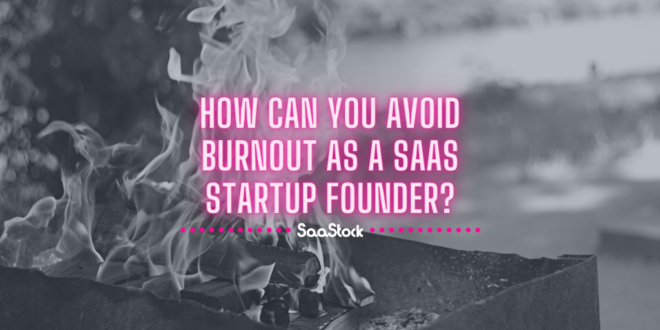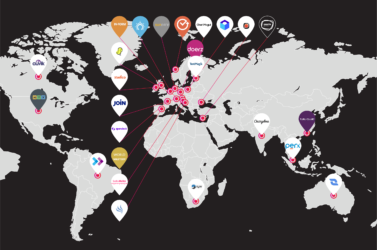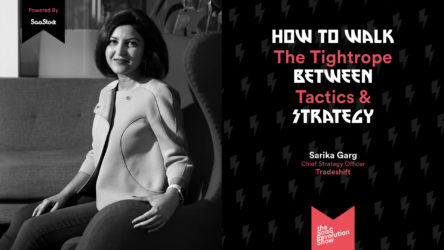Being a first-time startup founder can be a lonely journey, especially if long-time friends and peers have taken a more conventional career path. And 2020 has been particularly demanding: in May 2020 Blind found that 73% of surveyed tech workers are burnt out, thanks to a combination of working longer hours, working from home, not taking paid time off, and increased anxiety levels.
At SaaStock we’re committed to helping SaaS founders gain traction, grow and scale their startups – but not at all costs. This blog post shares advice from other startup founders from around the world, on how to stay healthy and sane on this journey. It covers five main areas that we hear startup founders talk about as important for battling burnout:
- Physical health
- Mental health
- Personal relationships
- Professional relationships
- Sleep and rest
What is burnout?
How can you tell if you’re feeling a normal level of founder stress, or if you’ve tipped over into burnout territory? Psychologist Christina Maslach, states that burnout consists of three distinct components:
- Exhaustion: You’re wiped out emotionally, physically, or cognitively (or all of the above). Even rest or sleep don’t help you feel replenished.
- Cynicism: You bring a sour attitude to the office each day. You aren’t engaged with your work, and you often feel irritated, short-tempered, and detached from your team.
- Inefficacy: You feel like you can never keep up with the demands of the workplace, despite the fact that you know you were skilled at doing so in the past.
Joel Gascoigne, CEO of Buffer, wrote extensively of his experience with burnout as a startup founder in 2017:
“This is how I’d describe my experience of burnout: I lost motivation. I just didn’t care. I knew I cared deeply, but I had nothing left. I couldn’t get up in the morning. I felt very sensitive and emotional. It was like anything could set me off, and make me well up. I cried a lot, by myself and with people close to me.”
Sound familiar? We hope not. But if you are recognising some of your feelings in any of the above, in the next sections of this post we’re sharing five crucial areas of focus when battling and preventing burnout for startup founders – and even your employees.
1) Look after your physical health
At the end of every episode of The SaaS Revolution Show, SaaStock CEO Alex Theuma asks each guest: how do you stay healthy and sane on your journey as a startup founder?
The most common response: exercise.
“I powerlift, that helps a great deal – a few times a week just some exercise, lifting heavier and heavier every time. Really challenging yourself – it’s kind of like my meditation. Because when you’re lifting you really can’t think about anything else – or you’d better not or you might be in trouble!” – Joi Siggurdson, CEO, Crankwheel
Whether you’re into running, yoga, weight lifting, spin classes, hiking, rock climbing… fitting regular exercise into your routine is essential for avoiding burnout and staying healthy as a founder (and a human!)
But as well as the physical benefits, there’s plenty of mental and emotional benefits to regular exercise. When you’re working out, you’re away from your desk, your emails, and your never-ending to-do list. It builds a little time into your day to mentally recharge, reflect, and refresh.
2) Look after your mental health
As a founder, entrepreneurship is both physically and mentally draining, so it’s essential to take care of your mental wellbeing as well as your physical health.
Understanding and taking care of your mental health will help you build your resilience:
“I actively see a therapist, which up until as recently as ten years ago isn’t something people perhaps would talk about, but it’s been such a change to my ability to stay calm, stay productive and maintain emotional composure. I would highly recommend it to any founder.” – Rahul Vohra, CEO, Superhuman
As well as seeing a therapist (which is something we see more and more founders talking about and sharing openly), other common ways to look after your mental health include meditation and journaling.
Of course, meditation alone won’t help you beat burnout, but the points we cover in this post will help you identify ways to take care of yourself, build resilience, and hopefully reduce the likelihood of burning out in the future.

3) Make time for your relationships and hobbies outside of work
The founder journey can feel lonely and isolating at times, which makes your personal relationships so important. Especially in the early days of building your startup it can be easy to go all-in and hyper-focus on what you’re building, 24/7.
But spending time away from work is essential to avoiding burnout:
“I think you just feel better and you can do it for much longer if you’re happy, if you’re well-rested, if you have a good family or social life outside of work. For me it’s about spending time with my family, and kind of disconnecting from work during the weekend.” – Avi Meir, CEO, Travelperk
Having something that’s important to you outside of work will help you build a healthy balance that’s essential for avoiding burnout. This includes friends and family, but also hobbies that aren’t related to work:
“I’m a big believer in creativity, so I play music in a band, I do art, I do comedy, I do standup… I do whatever I can because I find that the best ideas happen for the [work] stuff when you’re not focussed on it. When you’re in the middle of, say, doing a standup set, and you have the idea that’s going to help your business the next day. It’s kind of what I think of as work/life balance.” – Jason Reichl, CEO, GoNimbly
The chance of burning out increases if work is your everything (which is possibly why we’ve seen more and more startup employees struggling with burnout during the COVID pandemic in 2020, as they spend more and more hours working and have less division between work and home). That’s why friends, family and hobbies are all so important: they give you an identity that’s not completely entwined with your business.
4) The right professional relationships
As well as your personal relationships, your professional relationships can play an important role in combating burnout:
“From a work point of view I just want to mention it – really making sure I have the right support, the people I can delegate to, the people I can lean on for help – that’s really important.” – David Darmanin, CEO, Hotjar
At the earliest stages of building your startup, you’ll have to do everything. But as you build a team, you have people around to delegate to, to share some of the responsibilities of the day-to-day running of your company. Having people you can rely on means you can take time off and things will keep going without you.
We also regularly hear from SaaS founders that one of the most important things for them is having a community of other founders to connect with and learn from. From starting out on your own, to hiring your first team members, to raising funding, to scaling up – the founder role changes every step of the way. As your company grows from startup to scaleup, you need a community around you to learn from and support you.
5) Making sleep and rest a priority
One of the most important things you can do to combat burnout is to prioritise rest and sleep. Rest and time off shouldn’t be the last thing on your list, to squeeze in if you have time. It should be a deliberate priority.
“Recently I’ve started to try to get 8 hours of sleep a night. Before I was getting probably like 4-5 on average. I was just always going, feeding on the adrenaline of everything going on, and… you know, money never sleeps – but it should! And you’re better off for it.” – Michael Litt, CEO, Vidyard
As well as contributing to your overall health and wellbeing, getting plenty of sleep can also help with your focus and decision-making, which can only be a good thing for your business:
“Get some sleep. Sleep’s always a good thing. You make much better decisions if you get some sleep.” – Eric Boduch, Co-founder, Pendo
As well as sleep, rest time is crucial. This means taking vacation time, just like your employees. It’s important to remember that building your startup is a marathon, not a sprint: you can’t work 365 days a year for five, ten years. Taking regular breaks and regular vacations gives you time to rest and recharge, so you can maintain the level of intensity that’s required to lead your growing startup.
Closing thoughts
If you haven’t experienced burnout, it’s easy to assume it will never happen to you. But building a successful startup is hard work. It takes months and years of all-in commitment, and can feel like a lonely or isolating journey at times. Add to that the constant evolution of the founder/CEO role as your startup scales up, and you’ve got all the ingredients of a high-stress environment.
The five areas we’ve covered above won’t stop you from burning out, but if you invest in each one alongside investing in your startup, it will set you up for a healthier, more balanced approach to work, which will help you in the long run.
Additional resources
For more on beating burnout and looking after your mental health as a founder and for your team, check out these videos from SaaStock events in 2020:




